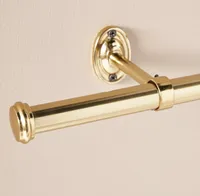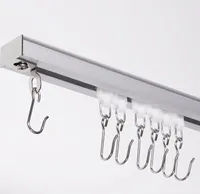How to perfectly frame your windows with the right curtain rails for your room
The expert guide to choosing the perfect curtain rail for your room, from the trending hardware to measuring those irregular shaped windows

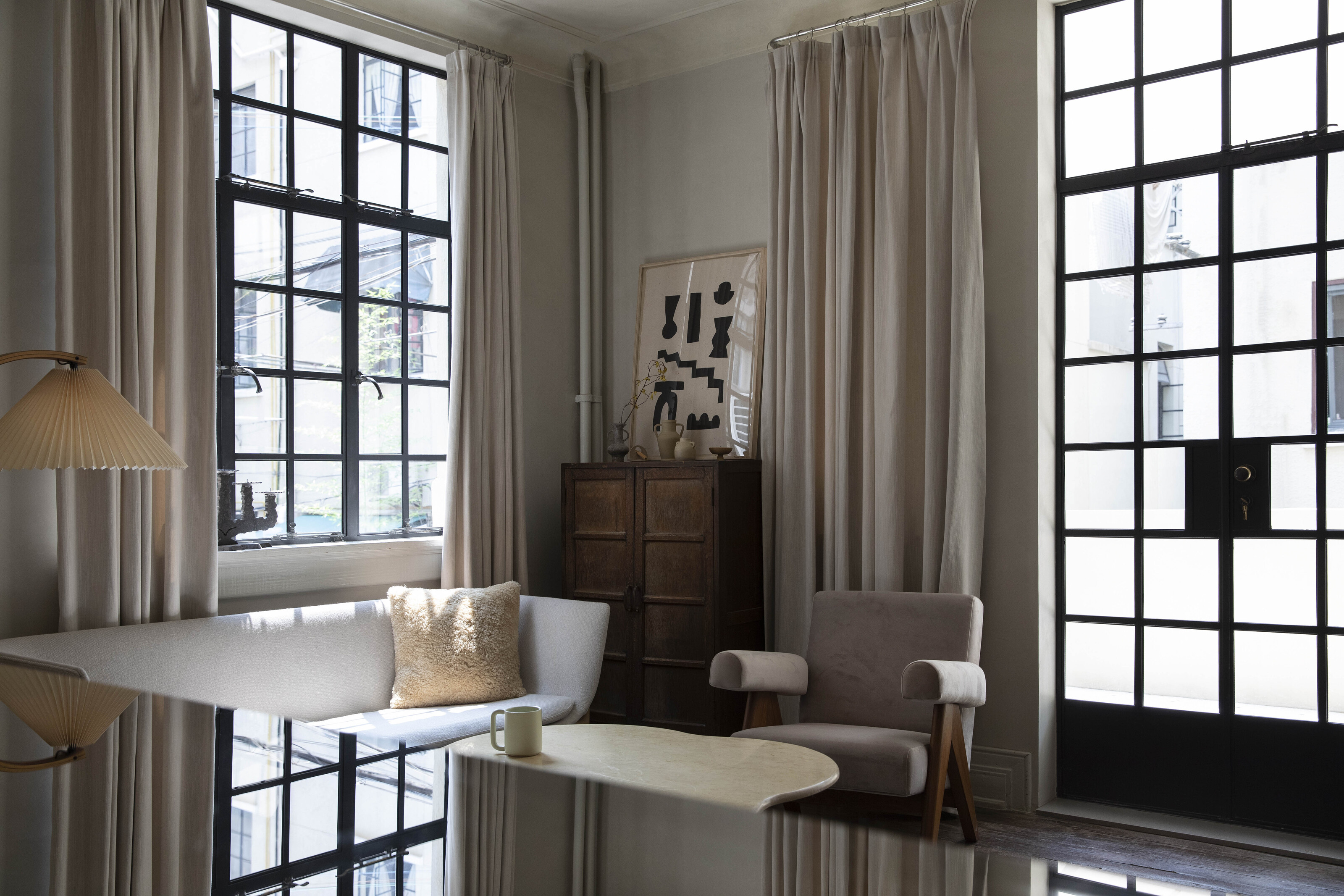
The Livingetc newsletters are your inside source for what’s shaping interiors now - and what’s next. Discover trend forecasts, smart style ideas, and curated shopping inspiration that brings design to life. Subscribe today and stay ahead of the curve.
You are now subscribed
Your newsletter sign-up was successful
Often when choosing curtains, all our time and effort goes into the selection of the fabric. The material is vital for the overall feel and ambiance of a space, but holding it all up is the curtain rail itself, helping to display the curtain and the fabric you’ve carefully selected.
To showcase the material at its very best, it's crucial to get the rails right. 'The right curtain poles can be a fabulous frame for beautiful curtains and there is so many brilliant finishes available,' says interior designer Lizzie Green.
The measurements, the hardware, the brackets are all crucial to making sure your window is perfectly dressed, so to help, we've come up with this handy guide for your modern window treatment.

Oonagh is an interiors writer and editor, and expert at keeping up with trends. She's also a keen online shopper, with shopping baskets full of decor must-haves that reflect wider trends from the world of interior design. For this story, she's spoken to the designers to find out the ins and outs of curtain rails, and how to pick the perfect hardware for your window treatment.
How to measure curtain rails
The trickiest part of installing your curtains is getting the placement of the curtain rod spot on, something that can instill fear in even the most adept DIY-er. Ultimately, it is a different measuring process based on the style of window and the height of the ceiling, but get the standard measurement process right and you can adapt it to whatever frame you have.
Firstly, when measuring curtains, get yourself a steel tape measurer for the most accurate results.
You must consider the height and drop you wish to have before doing anything. As a general guideline, measure and place your rod 2-6 inches above the window, but it’s worth considering positioning the pole as high as possible, as this will create the maximum sense of length in the room, and help your ceiling look higher.
'In terms of width, allow 4-8 inches on either side of the window to ensure the room will benefit from maximum natural light and any window views with the curtains ‘stacking’ away from the glass when open,' says Caroline Milns from Zulufish.
The Livingetc newsletters are your inside source for what’s shaping interiors now - and what’s next. Discover trend forecasts, smart style ideas, and curated shopping inspiration that brings design to life. Subscribe today and stay ahead of the curve.
In terms of how far out from the wall you want your rod, 3 inches is the go-to gap.
How to measure curtain rails for bay windows
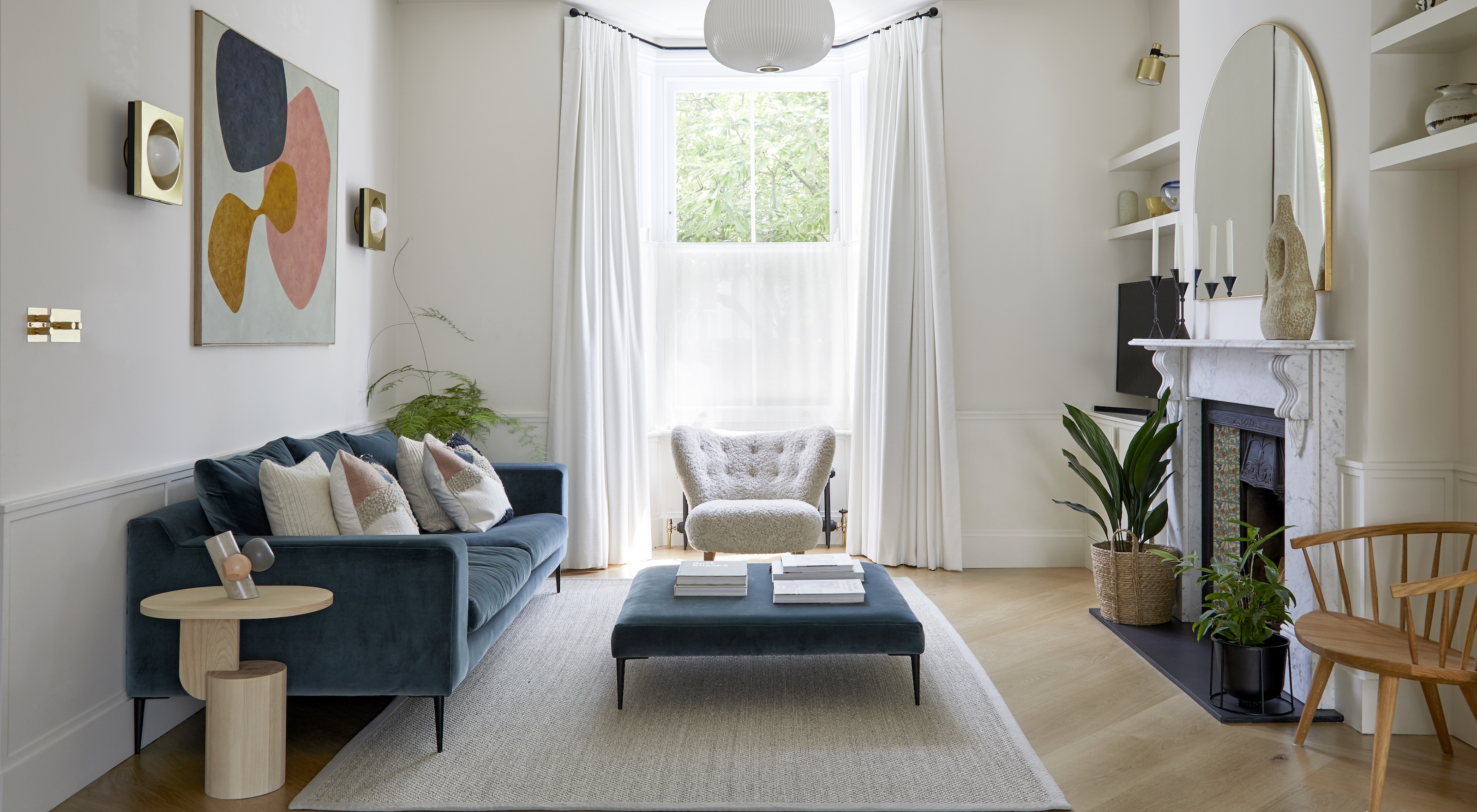
Bay windows are mostly three or five-sided, but they can also be two or even up to seven. When it come to measuring for bay windows, you might initially feel a little daunted, but fear not, with this simple formula you'll be hanging your curtains in no time.
First up, measure the width of the first side of your bay, where the pole is to be fitted and not the window itself, up to where it meets at the angle of the next section of the bay. Allow for an additional 6 inches along this side so that the pole can pass past the window along the wall and your curtains can be pulled past the window when opened.
To measure the width, place a tape measure on the left side of the window at the start of the first section, then stop the tape measure right before the start of the adjacent section. For the best results, ensure the tape measure remains level, make sure it is a steel tape measurer, and keep jotting down those measurements so you remember as you go.
Then, measure the width of the next section of the bay and write down the measurement. Continue around the bay until all sides are measured. A common curtain mistake is to assume that the window is symmetrical - some aren't! Remember to keep adding 6 inches to the length of the last side of the bay.
It's also useful to know the lengths in between corners which tells your professionals the angle at which the track needs to bend, so jot these down.
Give these measurements to a professional and you will be asked to specify whether you want the curtains to be drawn to one of the sides or if you prefer a two-way draw. Also make sure they know whether the rods are to be mounted on the wall or from the ceiling.
Curtain poles are not suitable for curved bow windows. If you have a curved window you'll need a curtain track instead.
How to measure for arched windows
'Measuring curtains for irregularly shaped arched windows can be a challenging task,' says Houston-based interior designer, Nina Magon. 'To ensure a proper fit, it is important to measure the window accurately. Begin by measuring the width of the window at the top, bottom, and middle. Then, measure the length of the window from the top of the arch to the bottom of the window sill.'
What materials are best for curtain hardware?
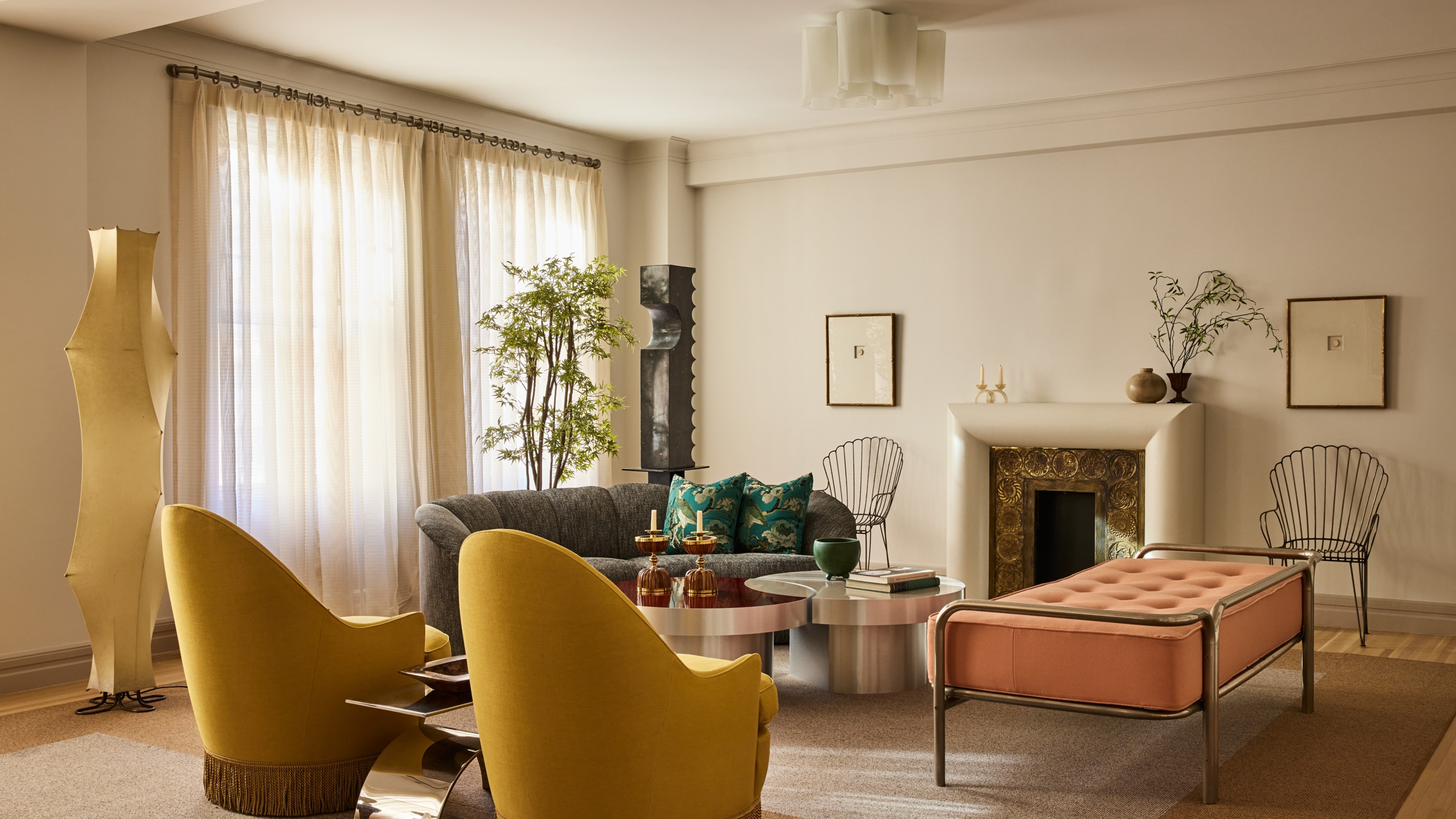
Drapery hardware doesn't sound like a particularly exciting part of the decision-making process, but it's actually a moment to pull the room together and complement the style of the interior design.
Your material of rod should complement the fabric. Heavy fabrics might want more decorative rails, while light cotton or sheer fabric could have more lightweight, discrete rods. Think about the hardware and how it reflects the style of your room. A more traditional style room might require brass or wood hardware, while in a modern space you might want to hide your curtain rails altogether or go for streamlined and minimalist chrome or black iron. 'In terms of material, we often use bronze or wood to complement other fittings and finishes within a scheme,' says Lizzie Green.
Finials are an important part of the curtain rod too. The decorative ends to your curtain rail, they can have a surprisingly profound effect on the room. These accessories can be large or small, intricate or simple, wood or metal, or round or square.
Finials typically come in 1-inch sizing. If you have a larger room and taller ceiling, go for more dramatic and larger finials of around 2 inches to really take up the space. In a smaller room, you might want a more discrete finial.
Smithery curtain rod from Anthropologie
A simple, gold design crafted from aluminium, this contemporary style rod is a lovely backdrop to offset your chosen drapes.
How to hide curtain rod brackets

Rod brackets help your curtain poles stay up, and are another essential part of the rail. Embrace them and go decorative, or if you're trying to go for the sleek, minimalist feel, there is the option to hide curtain rod brackets.
This are a plethora of ways to hide curtain rails. You can conceal curtain tracks and rails by recessing the rod into the ceiling, hiding them among the crown molding, using the architecture of the room. 'When selecting curtains for the hidden cornice, it is important take into account the dimensions of the niche,' says Alla Yaskovets of O&A London. 'The depth should be 2 1/2 - 3 inches and width can vary depending on windowsill size and radiator placement, ensuring that when opened or closed, curtains do not touch these fixtures.'
You can also hide rod brackets by discretely painting them the same color as the wall so they hopefully fade into the background, or install a pelmet to hide the unsightly rod brackets.
Tracks are another option that mean you don't have to use rails and brackets, and instead can use curtain tracks. These are often quite a cheap alternative, are often made from plastic, and work with the fabric attached to the track with small hooks. The fabric should close easily with a smooth glide to open or close. Most curtain tracks are hidden by the curtain header too, so you have a really seamless finish.
Do I go for curtain rails or track?
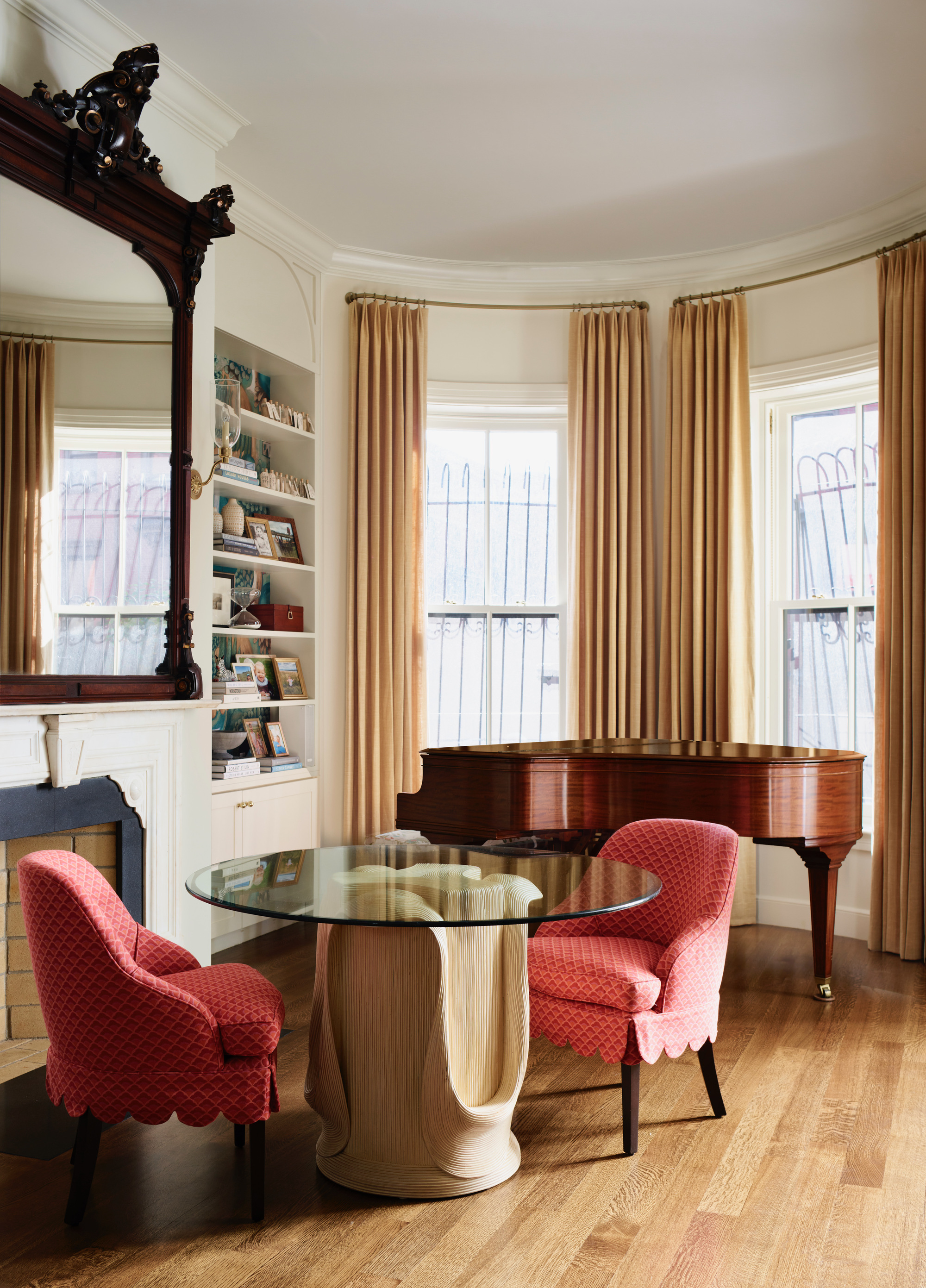
Ideal for bay and bow windows, curtain tracks are the go-to choice when you want your curtain fabric to be the focus, with a minimalist look at your window. Curtain tracks are made of plastic or metal and the curtain fabric is attached to the track with hooks. The track is fixed close to the wall or ceiling and the curtains glide smoothly along it. When closed, most curtain tracks are hidden by the curtain header, giving you a discreet finish.
Aluminium alloy ceiling track for curtains from Amazon
Another positive spin on curtain tracks is that they tend to be pretty cheap, with these easy-to-instal from Amazon just $51.99 and available in a fair few lengths.

Former content editor at Livingetc.com, Oonagh is an expert at spotting the interior trends that are making waves in the design world. She has written a mix of everything from home tours to news, long-form features to design idea pieces, as well as having frequently been featured in the monthly print magazine. She is the go-to for design advice in the home. Previously, she worked on a London property title, producing long-read interiors features, style pages and conducting interviews with a range of famous faces from the UK interiors scene, from Kit Kemp to Robert Kime. In doing so, she has developed a keen interest in London's historical architecture and the city's distinct tastemakers paving the way in the world of interiors.
